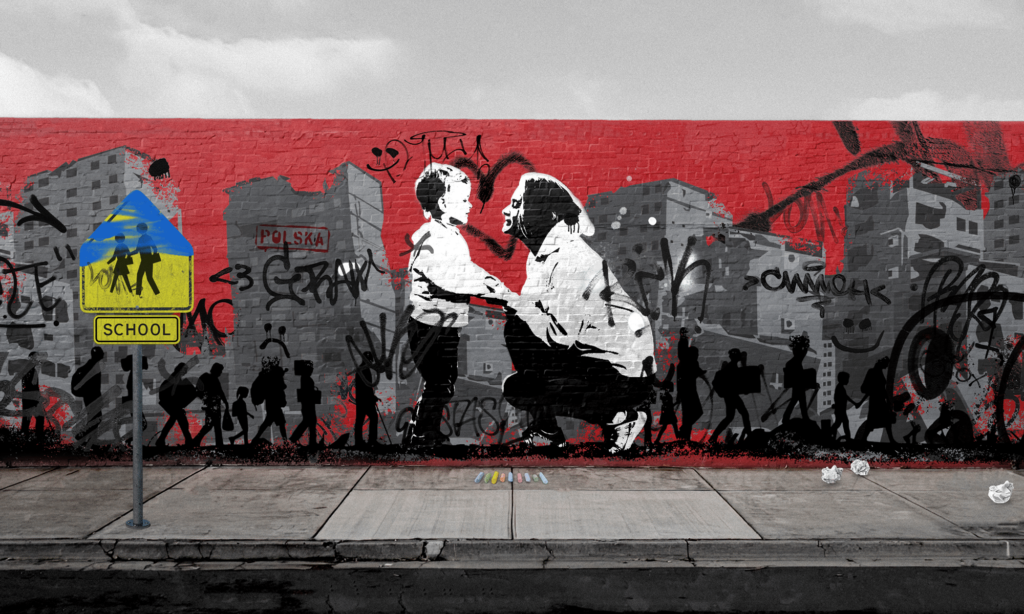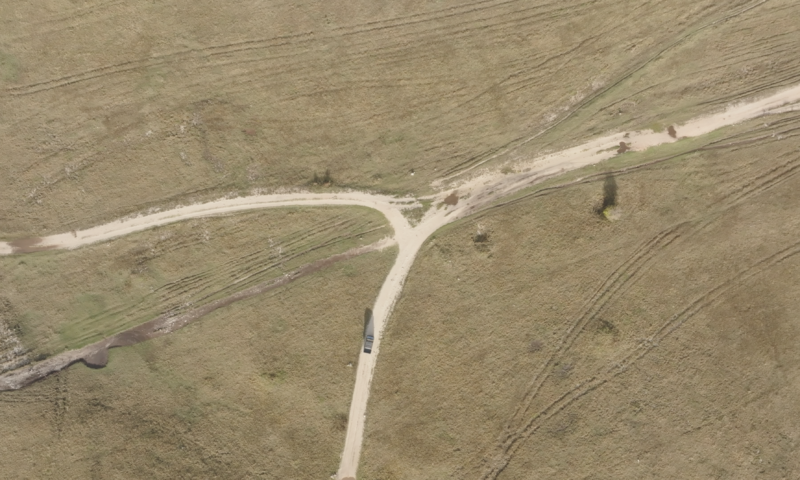This article was originally published by Balkan Insights.
Six-year-old Nikita drew the red-and-white Polish flag on a notebook and then crumpled up the piece of paper. His mother was shocked to see the gesture, so she slowly prodded him until the truth came out about what had happened earlier that day in kindergarten.
Originally from Odessa, Aleksandra and her son Nikita left for Poland in March 2022 in the wake of Russia’s invasion. In spring of this year, when this scene took place, they were living in Warsaw and the boy was attending zerowka in a public kindergarten (a preparatory year before school, which most Polish kids complete in kindergarten). In Poland, Ukrainian refugee kids were simply allowed to enrol in public schools and kindergartens, and Aleksandra was one of the parents who took advantage of that opportunity.
The adjustment was not easy, but Nikita was making progress. Like him, many Ukrainian kids simply had to manage in classes where teachers and other students spoke only Polish. Both languages are Slavic, so the government has been betting on Ukrainian kids simply absorbing Polish as they go along. Nikita did struggle in the beginning, complaining he didn’t understand anything, refusing to leave the house in the mornings or being aggressive towards other kids.
However, by the autumn of 2022, things were looking up, especially because Nikita had started speaking Polish. He was still mostly playing with Ukrainian kids from other classes during playground breaks, but he was slowly starting to engage with the Poles.
The day of the crumpled flag, Nikita told his mother, he was having lunch in the canteen at the kindergarten, sharing a table with four Polish kids. Suddenly, one of the boys looked at the others and said: “Let’s take a vote, who of us thinks that Nikita should stay in Poland and who thinks he should go back to Ukraine”. To Nikita’s despair, the boys unanimously voted for the second option.
“The teachers never even told me about that situation,” Aleksandra recounts. “In general, it has been difficult to communicate with them. They spoke no English and they didn’t understand me when I tried to speak Ukrainian or Polish using Google translate on my phone.”
“No one helped Nikita, he just had to manage on his own,” Aleksandra concludes, though overall she still describes their story as one of successful integration. In first grade now in a public school in Warsaw, Nikita started the year already speaking Polish, has a Ukrainian best friend in the same class, but relates well with the other Polish kids and can follow the lessons.
Like Nikita, many Ukrainian refugee kids made their way to Poland and Romania in the months after the war started, with hundreds of thousands continuing to reside in the two countries, the vast majority in Poland.
War and exile have placed a significant psychological burden on these children and their families, yet, almost two years into the crisis, they are not receiving all the support they should. While both Central and Southeast European countries opened their doors generously to Ukrainian refugees when the war started, they lacked the experience with refugee integration to find optimal solutions. Additionally, some would argue, the governments have demonstrated little political will to use this situation as an opportunity to develop those integration mechanisms.
Even serious problems
However, certain situations that Ukrainian children find themselves in can be much more difficult. Mainly teenagers, for example, are facing mental problems such as depression, panic attacks and even post-traumatic stress disorder (PTSD), according to specialists.
Mariya (not her real name) is a 17-year-old girl who came to a psychologist at the urging of her family. “When we first met, Mariya didn’t say a word, just sat quietly. She was completely withdrawn,” says Yanna Nikolaichuck, a Ukrainian psychologist now working for a humanitarian organisation in Bucharest. “I just asked her to start drawing, to express what she was feeling, whatever came to her mind. She kept silent, but also kept drawing. Only I was doing the talking.
“Everything worked like that for about five months, when suddenly she started talking and telling me what each of her drawings represented,” says Yanna Nikolaichuck, cheerfully.
Now Mariya behaves normally, goes out of the house alone, talks to people and has made her first friends.
Nikolaichuck says that the most affected group, with the most serious psychological problems, is teenagers. For younger children, the adjustment to refugee life is easiest, as they often only need their mother or other family members around. Similarly, adults are coming to terms with their new life and trying to find solutions to the problems they face.
“But teenagers are the most vulnerable group. They need a world of their own, with friends of the same age who understand their problems, whom they can trust. But the war has destroyed that world and they don’t fit into the new reality as refugees,” says Nikolaichuck.
The psychologist says that in such cases, young people can show symptoms of mental illness. “Some of them refuse to eat, refuse to talk. Others simply refuse to wash. Sometimes, of course, they have suicidal thoughts. It’s their way of reacting to the problems they face.
No matter the problems, family intervention is decisive, as the parents are able to create a sense of safety for the kids in the midst of uncertainty. “In most of the cases where the family is trying to get help, it’s going to be okay,” says Anna Szadkowska, a psychologist from Lublin, who coordinated a municipality crisis response centre active in the first months of the war.
“The people who really struggle are those where there were deep problems in the family even before the war and then the trauma of the conflict added up on top of that,” Szadkowska says. “The worst is when we realise something bad is happening in the family, but we know the intervention system doesn’t work too well – not even for Polish kids, let alone refugee ones.”
Psychologists are using a broad range of tools to help traumatised kids. Liliya Vahnianina from Caritas Poland, for example, often resorts to a set of cards produced in Ukraine especially for this purpose, each of which has an image associated with the war painted on it.
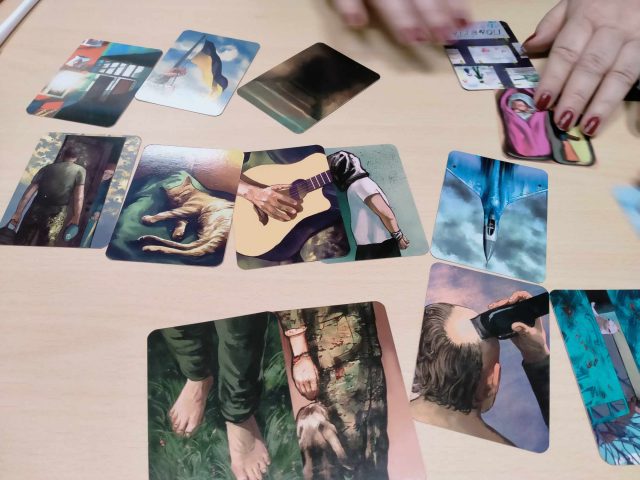
“We first ask the kids to pick three cards that they find scary, that they would never want to show anyone. They often choose those about the father being kidnapped or the cities under bombardment. Then, we ask them to choose a card they like, and they often pick those of reunited families. That second choice helps us orient their thinking towards the future,” Vahnianina explains.
For her part, Yanna Nikolaichuck uses mainly art therapy, but also “psycho-trips”, as she calls the travels across Romania organised for groups of teenagers, aimed at facilitating their communication and integration.
Specialists also recommend involving young people in volunteer activities. “What helps in dealing with the sense of guilt many of them – especially teenage boys – feel for not being there in Ukraine to help with the war effort is to suggest for them ideas for volunteering, by collecting aid for their country for example, which gives them a sense of agency,” says Beata Staniszewska, a psychologist working for the Polish Migration Forum. “It helps them get back a sense of control in their lives and understand that the trauma they lived through doesn’t determine their future.”
Early Days
Immediately after their arrival in a new country, the refugee families focus just on finding a home and normal way of living. Very often, mothers’ contact with their children is reduced to the issues of basic survival and functionality, leaving little time for deeper emotional communication.
For their part, kids are completely scared with the new situation and end up being angry, often at their mothers, whom they blame for bringing them to a foreign country.
Some of the children might behave super-controlling and on guard all the time, while others, on the contrary, become completely apathetic and are not interested in any of the reality around them. Boys face a specific situation as, at least in the early months of the war, most of them just wanted to go back to Ukraine and fight in the war. Psychologists describe how, in sessions, they would wear camouflage gear and military boots, and only spoke about the need to go back.
Only after a few months could the refugees and their kids start reflecting on the double trauma of war and dislocation.
Working in a ‘grey zone’
Yet it’s clear that Ukrainian kids’ mental health care needs are far from being met, as the number of psychologists and psychiatrists working for them is very low in both Poland and Romania, while the money and expertise received from public institutions is inadequate, a BIRN analysis of the situation in both countries concludes.
Bogumila Chodzynska, a psychologist helping migrants through the Ocalenie Foundation, complains about a lack of systematic solutions from the Polish state at multiple levels.
“The philosophy that seems to be at play here is ‘it will work out somehow’, when actually what we really need is for someone at the top to sit down and think about some centralised solutions. The way things work now, it just depends on whether you are lucky enough to run into an institution where the director is open to helping,” Chodzynska says, referring to both educational institutions and those offering psychological help.
Olena Koval, a Ukrainian psychologist who found refuge in Cluj, in central Romania, complains about the low numbers of “personnel who can provide mental health services in Ukrainian for the people in need”, as well as the “lack of a centralised way of communication that can help us share information and experiences”.
Moreover, her Ukrainian psychology diploma is not officially recognised in Romania, which leaves her and her colleagues somehow working in a kind of “grey zone”.
“We work either voluntarily or under the umbrella of some international organisations. I don’t know if the situation is known by the Romanian authorities, but at least no one has bothered us about it,” says Koval.
The situation is similar in Poland. Psychology diplomas issued in Ukraine are not recognised in most EU countries, preventing Ukrainian specialists from receiving money and assistance from Polish or Romanian public institutions.
Problems when attending schools in Poland
12-year-old Aleksandra, from Nikopol in eastern Ukraine, has been living with her mother and grandmother in a student dormitory in Lublin since spring last year after escaping their hometown to come to Poland.
In their new room the furniture is minimalistic and there is not even internet. But, given they have no source of income apart from about 700 zloty (around 150 euros) in child and disability allowances from the Polish state each month, they can’t afford anything else.

Aleksandra doesn’t go to a Polish school, but instead does online classes with her Ukrainian school back home, because her mother and grandmother believe they will be able to return home any day soon.
Since the war started, the Ukrainian state has been strongly supporting the continuation of online classes at its schools, in what observers say is partly an effort to keep kids connected to their home country in the context of the huge population exodus.
The family live in relative isolation, with most of their social relations limited to the other refugees living in the dorm and the local branch of the Catholic charity where they have been volunteering. It makes it much more difficult for them to become acquainted with any other options.
Around 180,000 Ukrainian refugee kids are currently enrolled in Polish schools, according to data from the Polish Ministry of Education. About as many are thought to be living in Poland outside of the school system here, like Aleksandra above, only pursuing Ukrainian online classes or not attending school at all.
Asked about the psychological consequences on kids like Aleksandra, who have been staying home and taking online classes for a year and a half now, Anna Szadkowska, the Lublin psychologist, exclaims: “That’s the problem! We actually have no idea how these kids are doing. They are out of school here so we don’t see them, the parents do not fully comprehend the consequences of their decision to keep them at home, and the Polish state does nothing to check up on them.”
For her part, Bogumila Chodzynska, the psychologist working with the Ocalenie Foundation, says there is a lack of linguistically and culturally adapted tests, of the kinds used to diagnose disabilities that might impact learning. Once again, some directors improvise solutions, but many don’t.
“And it’s the same with the schools,” Chodzynska adds. “Polish schools were completely unprepared when the war started and they overnight got a lot of kids with burdensome experiences, not speaking the language, and they just had to deal with it. It really depended on luck what school the kid found themselves in – whether the teachers and director showed goodwill and figured out ways to help.”
What happened de facto was that the Ukrainian kids started going to local schools and there the teachers simply had to manage the situation. In some cases, the schools or municipalities hired multicultural assistants whose role is to help migrant kids and their families navigate the new system and Polish people receive some cultural sensitivity training. But many schools didn’t have enough funding for even that.
In some schools, Ukrainian kids went to so-called preparatory classes, where they could learn Polish quickly before joining classes with Polish kids of the same age. According to most specialists, these types of classes have not been a success, because they led to the segregation of Ukrainian and Polish kids in schools, leaving the Ukrainian ones in classes with kids of all ages which was not motivating.
In many cases, Ukrainian kids, as in Nikita’s case described above, simply had to learn Polish as they went along, at first not getting anything and then slowly understanding more and more. A significant burden was placed on the teachers who, without having received proper diversity training, had to figure out ways to teach the lessons to kids from both countries while also maintaining group cohesion. Teachers reported emotional and physical exhaustion, Ukrainian kids felt left out, and Polish kids felt jealous that the Ukrainians were treated more mildly.
In the end, adaptation did happen over time in many cases. Yet some Ukrainian families also withdrew their kids for fear that the conditions at Polish schools were proving just too stressful.
When asked by BIRN to respond about the special needs of Ukrainian students in Polish schools, a spokeswoman for the Education Ministry said: “From the perspective of the ministry, the situation related to the education of refugee children from Ukraine is stable. Legal solutions introduced in this area allowed for the efficient inclusion to the Polish education system.”
She said there were currently 235 multicultural assistants working in Polish schools, compared with a peak of 509 at the end of 2022.
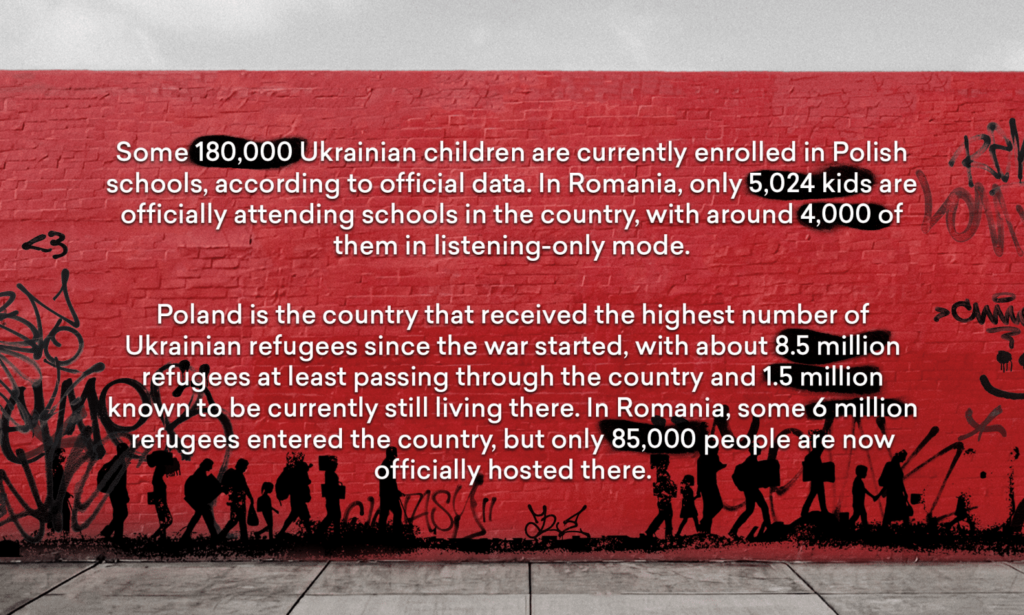
Failure of refugee integration in Romania
At first glance, you’d think nothing could faze Tatiyana Altuhova given what she’s faced recently. Still a young woman with long blonde hair and clear eyes, Tatiyana tells BIRN with apparent detachment about how the war in Ukraine forced her to leave Kyiv, together with her parents and two daughters. After a couple of months of living in harsh conditions in different places, the family decided to move to Romania.
But her eyes fill with tears when she talks about her children. Both girls had a rough time at first, with sleepless nights or mental stress expressed through war-themed drawings. They suffered most because they had to separate from their father, who has remained in Ukraine. Gradually, however, seven-year-old Zlata has become more integrated into her new life in Romania. She is now in second grade at a public school, speaks Romanian well, and has more and more friends. But Zoryana, now almost three, refuses to fully accept her new reality.
“It was hard to find a private kindergarten where Zoryana could be accepted, as she only wants to speak Ukrainian and prefers to stay mostly alone. Everyday I wait for a few hours near the kindergarten so that I can intervene rapidly if necessary,” Altuhova says. “We didn’t seek professional psychological counselling, I think with patience and care we can manage on our own or, of course, with the help of family and friends.”
But unlike Tatiyana – who at least has a part-time job in Bucharest and her children have no major problems – many other Ukrainian refugee women in Romania face a more demanding situation.
The main problem is related to the flawed way in which the Romanian government’s support program for Ukrainians works. Currently, every refugee receives financial aid (money for accommodation and meals) for only four months, during which time they have to find a job and try to integrate socially.
But, in reality, no Ukrainian can learn the Romanian language or find a suitable job in just four months, people BIRN spoke to contend. Moreover, the support program to all intents and purposes excludes pregnant women, single mothers or those with many children, who basically don’t have the capacity to take on a job.
A failure of the Romanian state in the process of integrating Ukrainian refugees can also be seen in the low number of children attending school. Less than a tenth of the Ukrainian children based in Romania attend an educational institution, despite the fact that – as experts stress – it’s better for their mental health to leave the house daily, engage with peers at school, and make efforts towards building a new life.
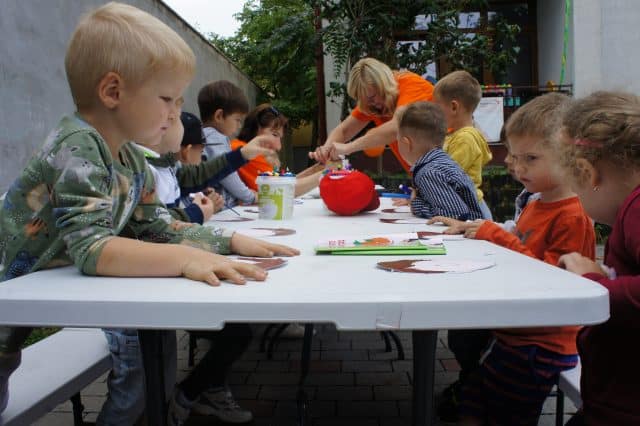
“Most of the Romanian schools are clearly not ready to accommodate Ukrainian kids, as there are almost no social assistants or psychologists who can help them to integrate,” says Mihaela Nabar, executive director of the charity World Vision Romania (WVR). “Moreover, as the kids are not speaking the language, such an experience would be only traumatic and a waste of time for them.”
Given such conditions, WVR together with some other organisations have assumed the role of making up for the lack of support that the Romanian state should offer to refugees. They provide psychological counselling, personal development and non-formal education to Ukrainian students, but also parental and professional counselling for Ukrainian adults.
“We try to help as much as possible to address kids emotional and social needs,” Nabar says. “But there is an urgent need for more to be done.”
